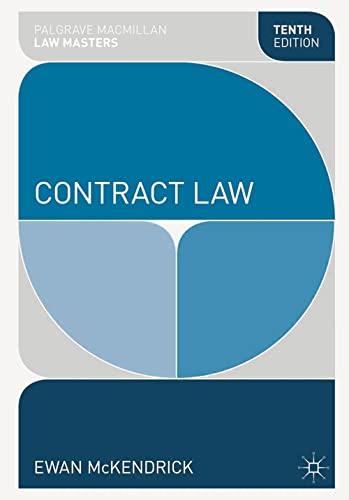Question
Amazing Internet Company ( Amazing ) is a start-up internet company that searches multiple auto insurance companies and provides insurance quotations on its website to
Amazing Internet Company ("Amazing") is a start-up internet company that searches multiple auto insurance companies and provides insurance quotations on its website to potential customers. Amazing is trying to keep its costs down, so it contracts with graphic design artists, content writers and researchers. Each contractor signs an agreement which states that the contractor is required to provide 20 hours of work per week, is paid a set hourly rate, reports to a VP at Amazing who assigns specific tasks as needed by Amazing (and that those tasks may change from time to time). The agreement also provides that each contractor may contract with other companies to provide similar services. Each contractor uses its own computer equipment to do the requested work. The contracts are for one-month and continue month-to-month until either Amazing or the contractor provides 30 days' prior written notice of termination. The form of the agreements say that the contractors are "independent contractors" and Amazing does not withhold social security and other taxes and does not provide company-furnished health care or pension benefits.
- What factors support that the contractors are independent contractors?
2. What factors support that the contractors are employees?
3. What risks could Amazing face from persons claiming that they actually were employees and not contractors? How could Amazing have changed its contractual relationship to have mitigated those risks?
Assume for the next question that the contractors are employees. Amazing advertises for a new graphic designer. You are the hiring manager. You get three applicants, all of whom are qualified. Amazing requires all employees to receive a COVID-19 vaccine. During the interview, you notice that one of the applicants appears pregnant. You ask if she has been vaccinated for COVID-19. She says that she is pregnant and does not intend to get a vaccine until after she is through lactating. You decide not to hire the applicant. The applicant files a claim that you have unlawfully discriminated against her because (i) she will not get a COVID-19 vaccine, and (ii) she is pregnant.
- Did Amazing unlawfully discriminate? What could Amazing have done to reduce the risk of a claim of discrimination?
Step by Step Solution
There are 3 Steps involved in it
Step: 1

Get Instant Access to Expert-Tailored Solutions
See step-by-step solutions with expert insights and AI powered tools for academic success
Step: 2

Step: 3

Ace Your Homework with AI
Get the answers you need in no time with our AI-driven, step-by-step assistance
Get Started


